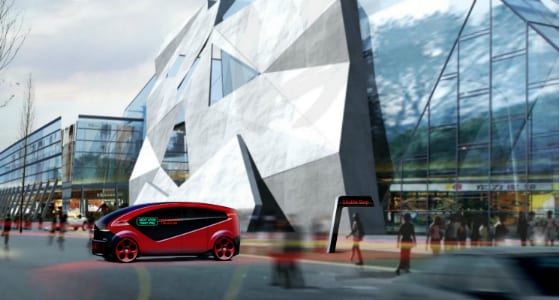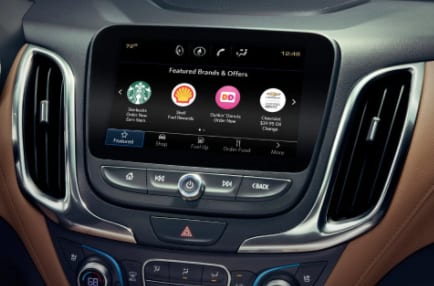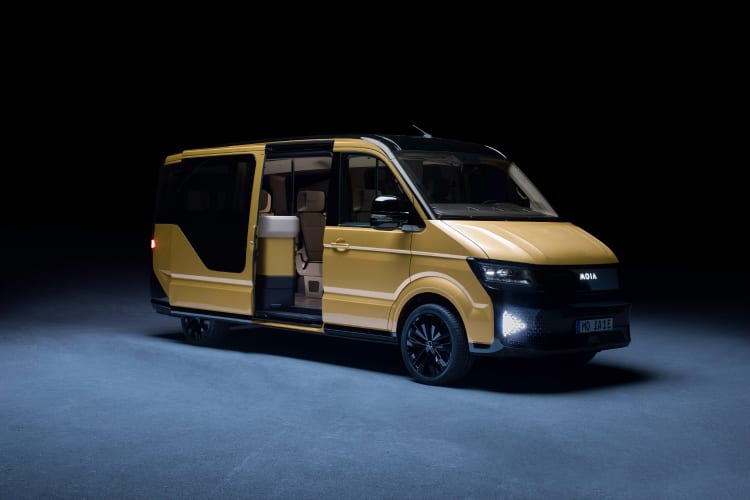TOP EV NEWS #1 – VEHICLES AS A SERVICE
More and more automakers are taking the disruption in mobility caused by the tech sector serious and are developing alternative business plans to stay relevant in a future where we are free from car ownership and services are stacked on a mobile platform. The German Volkswagen Group newly acquired start-up Moia unveiled it’s six-seater electric ridesharing vehicle the Moia Concept at the Techcrunch 2017 in Berlin. The Moai was developed in only 10 months and is expected to be commercially available by the end of 2018. The rollout starting in Hamburg is aimed to reduce traffic congestion in cities through Moia’s “One million cars of the road” mission. The Moia ecosystem includes a mobile app which algorithm groups customers with similar destinations to optimise cost and trips on the road.
The car developed through a co-creation process with multiple rounds of potential customers of all demographics has a range of more than 300 kilometers according to WLTP-standard and can be charged up to 80 percent in about 30 minutes. The car was developed and designed exclusively for ride pooling services, with ample space and individual seating so that passengers who wish to have no contact with other passengers feel comfortable onboard.
One of the fathers of the modern day EV and prominent Chinese entrepreneur, Wang Qicheng (Jack Wong) brought their companies together to develop new mobility trends and the elevation of integrated smart city concepts. Fisker Inc and Hakin Unique Group this week unveiled an electric autonomous shuttle, the Fisker Orbit, which will be delivered by Fisker from the end of 2018. Fisker Inc. and Hakim Unique Group will co-develop the autonomous shuttle ‘Fisker Orbit,’ in which Fisker Inc. will be responsible for technology development and product design, while Hakim Unique Group will be responsible for marketing and operation in China/Asia.

General Motors Co. (NYSE: GM) this week started with the rollout of what GM calls the first-ever commerce platform for on-demand reservations and purchases of goods and services, although I am certain some Chinese companies such as Baidu have already started similar services. Marketplace, allows eligible Chev, Buick, GMC and Cadillac cars to order food, find the closest gas station to save on fuel and make dinner reservations on the go.
“The average American spends 46 minutes per day on the road driving (according to the AAA). Leveraging connectivity and our unique data capabilities, we have an opportunity to make every trip more productive and give our customers time back,” said Santiago Chamorro, vice president for Global Connected Customer Experience, GM. “Marketplace is the first of a suite of new personalization features that we will roll out over the next 12 to 18 months to nearly four million U.S. drivers.”
For a list of the first brands accessible through Marketplace click here. The question now is how will Apple, Amazon, Google and other platforms react to the competition from the auto sector in their domain?

TOP EV NEWS #2 – CHINA REWORKING EV SUBSIDY
Aspects of the anticipated 2018 New Energy Vehicle rules for China revealed this week sent some EV related companies shares sliding. Bus and lithium cell companies were hardest hit as subsidies for buses is expected to be impacted the most. From the leaked 2018 NEV subsidy plan the new rules aim to incentives technology advancements to bring longer range EVs to market. The new requirements lift the threshold for energy density and fuel saving level while increasing the range whereby EVs can qualify for subsidies. The rules also put stricter requirements on load capacity consumption (Ekg).
To qualify for subsidies according to the 2018 rules vehicles will have to:
- Reduce energy consumption to no higher than 2.1kWh/100km down 14% from the 2017 level of 2.4kWh/100km;
- Energy density requirements are increased from 0.15Wh/kg to 0.2Wh/kg;
- Vehicles with a range below 300km will lose between RMB 4,000 and 20,000 on subsidies while vehicles with a range over 300km will see a bump in their allowable subsidy;
- Vehicles with a range below 150km will not qualify for subsidies, thereby in effect disqualifying the Plug-in hybrid
The subsidy for buses will come down to RMB 270,000 from RMB 450,000, a decrease of 66.6% while other commercial vehicles will also see their subsidy slashed by around RMB 75,000.
It will be interesting to see how foreign companies such as Ford adapt their EV strategies according to the new ruling. Ford this week announced that it would release 15 EVs in China by 2025. Ford who only have one EV in China, the Changan Ford Mondeo Energi with a range of 22 miles, does already not qualify for the current threshold of 32 miles.
In related news, Slovakia extended its year-old incentive of €5,000 for pure electric and €3,000 for plug-in electric vehicles to June 2018. Sofar 264 pure electric and 165 plug-in vehicles have been sold under the plan which contributed €1.8 million of the allocated €5.2 million set aside for the adoption of EVs.
TOP EV NEWS #3 – SAAB 9-3 REBORN AS NEVS STARTS PRODUCTION
The success rate for Chinese start-ups announcing the release of a new EV to physical production has been rather dismal if one considers names like Youxia and Faraday Future. This week, however, saw the start of production by NEVS of its 186 miles (300km) NEVS 9-3 model, a reborn SAAB 9-3, at the company’s Tianjin facility in China. NEVS which acquired SAAB in 2012 has been dogged with financial troubles from inception with a revolving door of investors which included Mahindra. Typical to many early EV start-up’s in China the company announced huge contracts for the supply of EVs in 2016 long before securing production capabilities. However, NEVS persisted and early in 2017 became one of only 15 companies with a permit to produce EVs in China. The Tianjin facility has a capacity of 50,000 units which will increase to 220,000 by 2019. The company also plans to start production at a plant in Trollhättan Sweden in the second half of 2018.

TOP EV NEWS #4 – TATA DELIVERS FIRST EV AND MAHINDRA SETS EV TIMELINE
On December the 6th Tata completed the first phase as the winner of the historic tender to deliver 10,000 EVs to the Indian Government. As per the requirement of the tender Tata delivered 250 Tigor EVs which will be followed by a further 100 units shortly. Tata Chairman, Mr. N. Chandrasekaran waved off the first Tigor EV from the production line at the plant in Sanand. Recently released specs of the Tata Tigor indicates that the EV will have a range of around 100km at a price of Rs 11.2 lakh. The Indian Government is expected to list a second tender in 2018 opening up the possibility for foreign automakers to compete in the Indian market.

Autocar India reported that Indian automaker Mahindra and Mahindra has set a timeline for producing three EVs by 2020 with a range up to 350km. The first EV to be produced by the end of 2018 will be the Mahindra KUV100 hatch with a range of 350km, top speed of an amazing 186km/h and accelerating to 100km/h in just 9 seconds. The second vehicle is expected to be based on the SsangYong Tivoli and have a range of 250km, top speed of a sober 150km/h and accelerating to 100km/h in 11 seconds. The third EV, an SUV, is expected to be influenced by Mahindra’s XUV Aero Concept introduced in 2016. Previous reports put the XUV Aero performance at a range of 300km and accelerating to 100km/h in 8 seconds. The three EVs will be developed on a new drivetrain design with outputs ranging from 90kW to 165kW and high-density 48V to 650V battery systems, with energy densities between 80 to 200Wh/kg in packs ranging from 10kWh to 70kWh.
TOP EV NEWS #5 – WM MOTORS SECURES CASH TO PRODUCE AFFORDABLE EVs
China Money Network reported that Freeman Shen, the former CEO of Volvo China and CEO of WM Motors billed by US media as the Tesla Motors of China, announced this week Baidu Capital led the investment in its $150 million round capital raising.
Baidu, the Google of China and investor in NextEV, created a $3 billion investment fund to invest exclusively in the fast-growing electric vehicle market attractive at a time when the vehicle and the internet are moving closer to each other. According to Jenny Wu, managing partner of Baidu Capital “Baidu is dedicated to building a new generation artificial intelligence open platform for autonomous driving in China, while WM Motor is a leader in combining AI, hardware, software and services in China.”
WM Motors will unveil its first car affordable mass-market EV with a range of 600 kilometers priced below $30,000 on the 11th of December. Judging from the sneak peek the WM Motors EV will be loaded with tech including facial recognition.

LATEST IN DEPTH COUNTRY EV SALES REPORTS AVAILABLE IN OUR SHOP
No Results Found
The page you requested could not be found. Try refining your search, or use the navigation above to locate the post.








